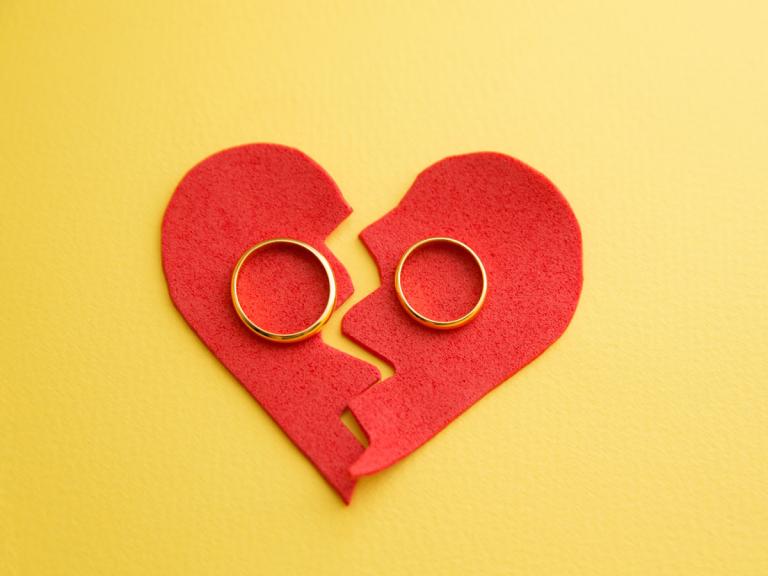When your marriage ends, it’s natural to experience feelings of rejection, anger, sadness, guilt, regret, or even relief. Self-defeating thoughts can seize you because you’re vulnerable and trying to come to terms with the changes that are occurring in your life. However, it’s important to realize that these feelings are a normal part of grieving and letting go after a break-up.

Marissa put it like this: “It was a long time coming and a mutual decision to divorce, but it was still a struggle to end our fifteen-year marriage and have to explain it to our two sons. The reality of living apart from Trevor was tough. We no longer love each other but the finality of our break-up is painful.
While it’s normal to go through a period of self-reflection when your relationship ends, it’s crucial that you keep things in perspective. Losing a partner, even if you made a decision to end the relationship, can disrupt your life on so many levels because your ex-partner was undoubtedly a part of your daily existence. As a result, breakups can weaken your ability to sleep, eat well, and function at work and in social spheres.
The reality is that breakups are hard. We’ve all faced them and been challenged by letting go of the why and how things could have gone differently. Goodbyes are never easy but it’s better to let someone go than staying with them out of insecurity or fear of being alone.
Ask yourself this: Do your fears of being alone prevent you from looking at your breakup honestly? For instance, it’s likely that there have been problems in the relationship for some time and that one or both of you have been unhappy. A recent study at the University of Toronto confirmed that a fear of being single can lead people to stay in unfulfilling relationships.
In terms of adjusting to the end of a relationship, the late Dr. Bruce Fisher coined two terms that shed light on how individuals experience different emotions depending on their role in the breakup. In Dr. Fisher’s groundbreaking book Rebuilding: When Your Relationship Ends, he writes “Dumpers are the partners who leave the relationship, and they often feel considerable guilt; dumpees are the partners who want to hang on to the relationship, and they often experience strong feelings of rejection.”
For instance, Janette made a decision to end her twenty-year marriage after six months of counseling. She initiated the process, filed divorce papers, and expressed some relief but also guilt during our last counseling session. On the other hand, her husband Kirk expressed feelings of sadness and rejection about Janette moving out. Janette stated: “The hardest part of moving out was coming to the realization that even though I made the best decision, I felt badly that Kirk didn’t want the divorce, even though we argued constantly and led separate lives.”
Further, if you were the person who was left (or the dumpee) feelings of rejection and loss may cause you to feel lowered self-worth and self-love. Be patient with yourself! As you learn to let go of self-blame and to love yourself again, your feelings of rejection will lessen and you’ll have more energy to relate to others in healthy ways.
If you find yourself ruminating about what went wrong, this is normal. Part of the grieving process at the end of a relationship is accepting that the marriage you thought you had no longer exists. While these feelings are more common for dumpee than dumpers, both people typically experience a grief process.
Here are 7 ways to heal from a breakup:
- Accept your feelings about the breakup and don’t judge yourself. This includes your emotional reactions such as sadness, anger, fear, rejection, and guilt. Crying can release tension and help the healing process. Don’t be surprised if you shed tears at unexpected times and feel intensely sad and perhaps a sense of relief afterwards.
- Gain awareness of the reasons your relationship ended. This includes some examination of your part in the relationship ending. Don’t get stuck in these thoughts but it’s helpful to gain insight so that you don’t repeat the same patterns in the next relationship.
- Work towards a routine for exercise and eating healthy meals. Are you taking care of yourself physically and emotionally? If not, devise a plan to nurture yourself and get your well-being restored (regular exercise, eating a balanced diet, etc.).
- Forgive Yourself. Focus on those things that you can control. You can’t control the past but you can begin to let go of hurt feelings. Attempt to forgive yourself and your former partner – or at least accept his or her behavior. This doesn’t mean you condone hurtful actions, but they simply have less power over you! Consulting a counselor, support group, or divorce coach may help to facilitate forgiveness and healing.
- Attempt to see relationships as teachers. We learn a lot about ourselves from loss and can approach a new relationship with our eyes wide open. Just because your relationship is over, it doesn’t mean you’re inadequate or inferior – or there’s something wrong with you. Give yourself a break.
- Nurture supportive relationships. It may be a challenge to be around other people but sometimes you might just have to force yourself to accept an invitation to a party or something simple like going to a movie with a friend.
- Try out new interests. Get energized by a new hobby and invite a friend to join you. Consider something that causes you to go outside your comfort zone such as an exercise class or glass blowing.
Taking an inventory of how your feelings may be impacting your behavior can help you gain a healthier viewpoint. Are you neglecting your health, interests, family, or friends due to grieving the loss of your relationship? It’s important not to fall prey to a victim mentality and to make self-care a priority. Keep in mind that you don’t have to be defined by your relationship ending and that dealing effectively with loss can cause you to better define who you are as a person!
Find Terry on Twitter, Facebook, and, movingpastdivorce.com. Terry’s award-winning book Daughters of Divorce: Overcome the Legacy of Your Parents’ Breakup and Enjoy a Happy, Long-Lasting Relationship is available on her website. Her new book The Remarriage Manual: How to Make Everything Work Better the Second Time Around was published by Sounds True on February 18, 2020.
I’d love to hear from you and answer your questions about relationships, divorce, marriage, and remarriage. Please ask a question here. Thanks! Terry













